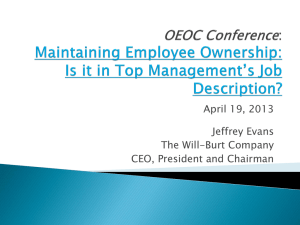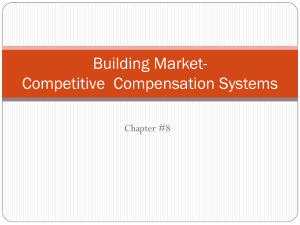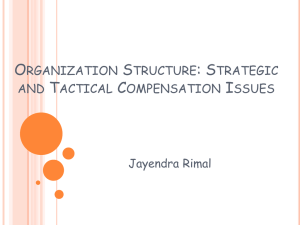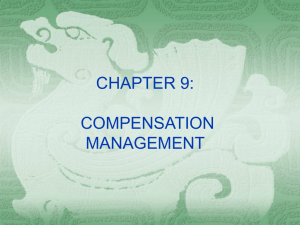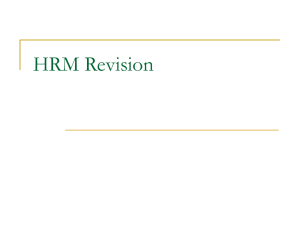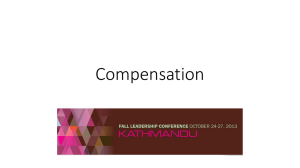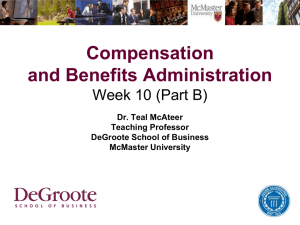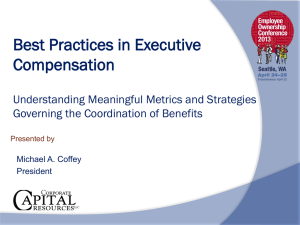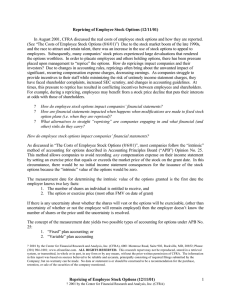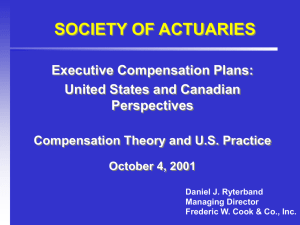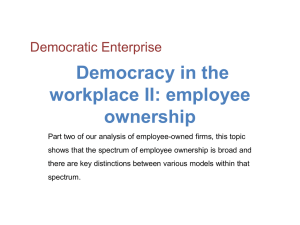Compensation Benchmarking.
advertisement
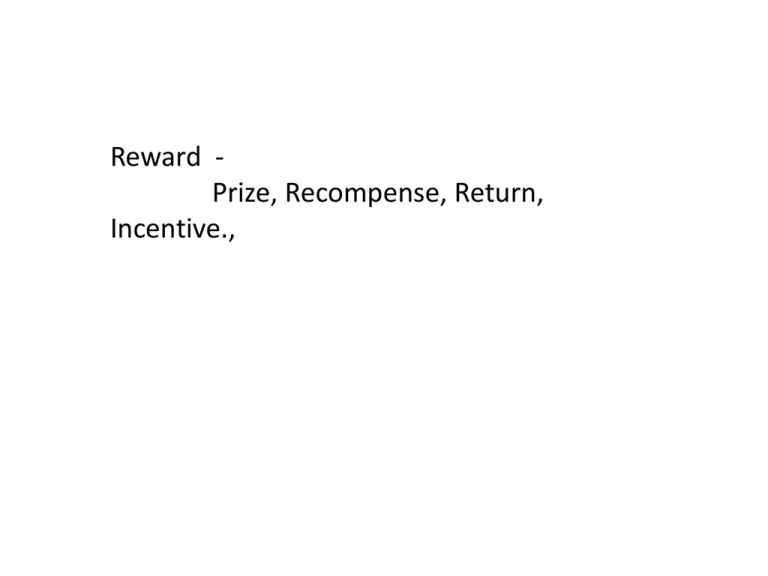
Reward Prize, Recompense, Return, Incentive., Process Compensation Benchmarking • For an organization to attract and retain talent, it is of utmost importance that it is able to provide an attractive compensation package. • Along with the brand value of the organization, for attracting top talent, a well designed compensation package plays a crucial role. • But, how does a company go about designing their compensation package? • Thus!!! Compensation Benchmarking is a key element in designing a pay package. Comparison • 1) Identify the companies having similar business or products. 2) Identify the companies from where you loose your talent and you hire your talent (Most Common Practice) 3) Identify the companies having similar Revenue and employee size in same group of business 4) Identify the companies where you want to be in next one year or so… 1. What are ESOPs? • An Employee Stock Option Plan is when the company offers its shares to the employees. • An ESOP is nothing but an option to buy the company's share at a certain price. • This could either be at the market price, or at a preferential price. 2. Why would a company offer an ESOP? • When you invest in shares, of a company. That makes you a shareholder or part owner in the company. • Owning an equity share means owning a share in the company business. • Companies offer their employees shares because it is considered that having a stake in the company would increase loyalty and motivation substantially. 3. When are they given? • There are time limits for availing this scheme. • For instance, you can acquire the shares after you complete a particular period of employment. • This could be a year, even longer. • If you quit your job before this period is complete, the stock options lapse. • Sometimes, the ESOPs are given in a phased out fashion -- 20% in the second year, another 20% in the third year, etc 4. When are they taxed? • The ESOP is not taxed on acquiring the shares. • You are taxed on the profit you make when you sell the shares or transfer them. ESOP-related attitudes and job involvement Perks • Benefits in kind (also called fringe benefits, perquisites, perqs or perks) are various nonwage compensations provided to employee in addition to their normal wages or salaries. persistence • Often, perqs are given to employees who are doing notably well and/or have seniority. • Common perqs are • take-home vehicles, • hotel stays, • free refreshments, • leisure activities on work time (golf, tennis, etc.), • stationery, • allowances for lunch, & Flexible pay • Flexible pay shall be awarded for extrameritorious performance that may include rewarding a variety of outcomes and behaviors e.g., project completion, sustained above average performance and revenue generation, etc. • There are two types of awards: • (1) Exceptional Performance Awards, and • (2) SPOT Awards. Variable pay • Variable pay is employee compensation that changes as compared to salary which is paid in equal proportions throughout the year. • Variable pay is used generally to recognize and reward employee contribution toward • company productivity, • profitability, • team work, • safety, • quality • The employee who is awarded variable compensation has gone above and beyond his job description to contribute to organization success. • Variable pay is awarded in a variety of formats including • profit sharing, • bonuses, • holiday bonus, • deferred compensation, • cash, and • goods and services such as a company-paid trip or a Thanksgiving turkey. • A Performance Linked Incentive (PLI) is a form of payment from an employer to an employee which is directly related to the performance output of an employee and which may be specified in an employment contract. • PLI may either be open ended (does not have a fixed ceiling) or • close ended (has an upper ceiling which is normally stipulated in the employment contract) • Open ended incentives are normally applicable revenue generating activities (e.g., Sales) and • Close ended incentives are associated to support functions (e.g., Operation, Human Resources, Administration etc.) Personal Tax • Personal Tax, popularly known as Income tax in India is an annual tax on income of individuals. The Indian Income Tax Act 1961 (Section 4). • Individuals are taxed on a progressive basis under three slabs. The slabs for individual taxpayers for the year 2011-12 is as below • Slab of Income (Rs)Rate of Tax (%)Upto 1,80,000Nil1,80,000 – 5,00,000105,00,0018,00,000208,00,001 and above30 • Resident woman below the age of 60 years, the basic exemption limit is Rs 190,000 • For senior citizens, individual of the age of 60 years or above but below 80 years, the basic exemption limit is Rs 250,000. • Individual of age of 80 years or above, the basic exemption limit is Rs 500,000
